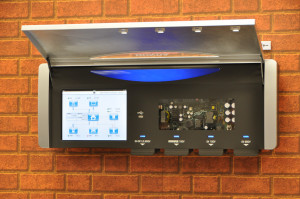Guest Post: Wired vs. Wireless Home Security System
Do you care about your family’s safety and security? What am I thinking asking this question – of course you do.

Never mind the catburglars who only want your valuables, it’s the home invaders you have to worry about. If you constantly watch your back, then you definitely need a home security system.
The primary purpose of a home security system is to deter burglars or would-be assassins from entering your abode. No, it’s not a system which will guarantee your safety and security to 100% (unless you build a panic room or something along those lines) but it’s better than nothing. If a forced entry alarm fails in deterring the home invaders, motion sensors are the second line of defense. As with many technologies today, there are different kinds of home security systems. The two basic kinds are wired and wireless. So the question is, which of the two would best suit your home?
Hard-wired Home Security Systems
Hard-wired home security systems have always been the favored choice by people especially if your home is still in the construction phase or the remodeling / renovation phase. Here are some of its advantages over a wireless home security system:
- It is less expensive
- More maintenance-free
- Parts rarely need to be replaced and, if ever they need to be, it will be easy to replace parts.
- More reliable
- Not susceptible to radio interferences
- It runs on electricity so there are no issues with power management.
- Allows greater distances between devices
If a hard-wired home security system has its pros, then it certainly has its cons or issues that you might want to consider first:
- It is highly recommended for a professional to install the system. The wiring of the system has to be done in such a way that it is neat and attractive but difficult and tedious for burglars to penetrate.
- The design for the components need to be included in the initial blueprints. Pre-wiring is a necessary step.
Wired home security systems are generally installed using either of the following configurations: open-loop and closed-loop. The alarm in an open-loop configuration is triggered when the sensor connections are closed. So if you open a door, the magnetic connection closes and the alarm is triggered. On the other hand, the alarm in a closed-loop configuration is triggered when the magnet separates from the magnetic switch. This means that the circuit has been interrupted. This is the preferred configuration because if a burglar tries to cut the wiring first, the alarm will sound as soon as the circuit breaks.
Wireless Home Security Systems
Due to the technological innovation at this time, wireless home security systems are gaining ground as homeowners are looking for the most convenient security system to install in their existing homes. Take a further look at some of the other reasons why you should go wireless as well:
- If you have an existing home and have no plans of doing any major renovations, this is the least “invasive” option
- You don’t have to cut into walls or rewire the whole house.
- It is the better option for those homeowners who are DIY specialists.
- Many wireless systems can be remotely armed and have a panic button function as well.
- Some systems can be installed with repeater units to increase the transmission range.
- Portability
- Can be easily removed or moved to another area or house later on.
Just like its big brother, wireless home security systems also have their ups and downs. Here is what you should carefully consider before deciding to adopt these systems:
- It is usually a more expensive option.
- Some people say that wireless systems are more likely to set off false alarms.
- Wireless security systems are susceptible to radio frequency interference so it should not be installed near other electronic appliances. A passing police car is also a common cause of false alarms.
- You have to constantly check whether the batteries are at full strength. If you can connect it to a main power source and use the batteries as back-up, that would be great.
- If you opt for the DIY approach, you must make sure that you’re placing the components in the right places. If, for example, the sensors are placed in an area where your pets constantly roam around, you’re going to have false alarms like crazy.
- If there is any damage to your system, it is highly possible that you will need to replace the entire system as individual components for that system may be hard to come by.
- Wireless home security cameras are power guzzlers and can completely deplete its battery life in 24 hours.
Whatever type of security system you end up choosing, it is always better to ask for a second or third opinion from other professionals. One can never be too complacent when it comes to the safety and security of their own home.
About Jessica
Jessica is a blog editor at Meiji Electric, the premier electrical supplier in the Philippines. She is a hands-on, technology-oriented girl and loves to tinker with the latest gadgets and equipment.

Wireless home security is often safer but evaluate the technology before choosing
There are pro’s and con’s to both wired and wireless, but in the long run, wireless will almost certainly prevail over wired systems, at least for home use. It’s cheaper in use, cheaper to install and cheaper to maintain and repair than wired systems, and though the tech might be vulnerable in other areas, it’s certainly the best choice for private users.